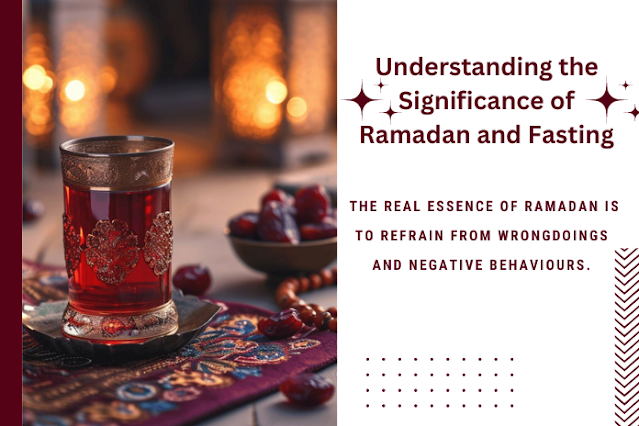Introduction:
Ramadan, known as the holiest month in Islam, holds profound significance for Muslims worldwide. It is a period of spiritual reflection, self-discipline, and heightened devotion. During this time, Muslims fast from dawn till dusk, abstaining from food, drink, and other physical needs. Beyond the act of fasting itself, Ramadan encapsulates a multitude of spiritual, social, and psychological benefits, making it a pivotal time in the Islamic calendar. In this blog, we will delve into the Significance of Ramadan and explore the top reasons for fasting during this sacred month.
Spiritual Reflection and Connection with Allah:
Ramadan serves as a time for Muslims to deepen their spiritual connection with Allah. By abstaining from worldly desires and focusing on prayer, Quranic recitation, and acts of worship, believers seek to purify their souls and draw closer to their Creator. The heightened spiritual atmosphere during Ramadan fosters a sense of inner peace and tranquility, enabling individuals to reflect on their actions, seek forgiveness, and strengthen their faith.
Self-Discipline and Personal Growth:
Fasting during Ramadan cultivates self-discipline and resilience. Through the practice of abstaining from food, drink, and other permissible activities during daylight hours, individuals learn to exercise control over their desires and impulses. This discipline extends beyond the physical realm, empowering individuals to exhibit greater restraint in their behavior, speech, and interactions with others. Ramadan thus becomes a period of personal growth, where individuals strive to overcome their weaknesses and develop virtuous qualities such as patience, gratitude, and compassion.
Empathy and Solidarity with the Less Fortunate:
One of the fundamental teachings of Ramadan is compassion towards those less fortunate. By experiencing hunger and thirst firsthand, fasting Muslims gain a heightened awareness of the plight of the poor and needy. This empathy fuels acts of charity and social responsibility, as individuals seek to alleviate the suffering of others through acts of kindness, generosity, and philanthropy. Ramadan thus becomes a catalyst for societal change, fostering a spirit of solidarity and compassion within communities.
Community Bonding and Social Harmony:
Ramadan is not only a time for individual spiritual growth but also a period of communal worship and fellowship. Muslims come together to break their fasts at iftar gatherings, sharing meals and prayers with family, friends, and neighbors. These communal gatherings promote unity, solidarity, and social harmony, transcending barriers of race, ethnicity, and socioeconomic status. The sense of belonging and togetherness experienced during Ramadan strengthens the bonds of community and fosters a culture of inclusivity and mutual support.
Health Benefits and Physical Cleansing:
While the primary purpose of fasting in Ramadan is spiritual, it also offers numerous health benefits. Research has shown that intermittent fasting can improve metabolic health, promote weight loss, and enhance cognitive function. By abstaining from food and drink during daylight hours, fasting Muslims undergo a process of physical cleansing and detoxification, purifying their bodies from toxins and unhealthy habits. Moreover, the discipline of fasting encourages healthier eating habits and lifestyle choices, leading to long-term improvements in overall health and well-being.
Strengthening Family Values and Traditions:
Ramadan provides an opportune time for families to come together and reinforce their bonds. From preparing special meals for iftar to performing nightly prayers as a family, Ramadan rituals create opportunities for meaningful interactions and shared experiences. Parents impart religious teachings and values to their children, instilling a sense of cultural identity and belonging. Moreover, the spirit of generosity and hospitality displayed during Ramadan fosters a culture of giving within families, as individuals prioritize the needs of others over their own desires.
Spiritual Renewal and Divine Blessings:
The significance of Ramadan extends beyond the individual to encompass the entire Muslim community. Believers view Ramadan as a time of spiritual renewal and divine blessings, during which Allah's mercy and forgiveness are abundant. The last ten days of Ramadan, in particular, hold special significance, as they include Laylat al-Qadr, the Night of Decree, believed to be the night when the Quran was first revealed to Prophet Muhammad (peace be upon him). Muslims engage in intense worship and supplication during these nights, seeking spiritual enlightenment and divine guidance.
Conclusion:
In conclusion, Ramadan holds immense significance for
Muslims around the world, serving as a time of spiritual reflection,
self-discipline, and community solidarity. Through the act of fasting,
believers deepen their connection with Allah, cultivate self-discipline, and
empathize with the less fortunate. Ramadan fosters a sense of unity and
compassion within communities, promoting social harmony and collective
responsibility. Moreover, the health benefits of fasting contribute to physical
well-being, while the emphasis on family values strengthens bonds and
traditions. Ultimately, Ramadan represents a time of spiritual renewal and
divine blessings, as believers seek Allah's mercy and forgiveness through acts
of worship and devotion.
Also Read: Embracing Ramadan 2024: Reflections from SKZ Foundation

